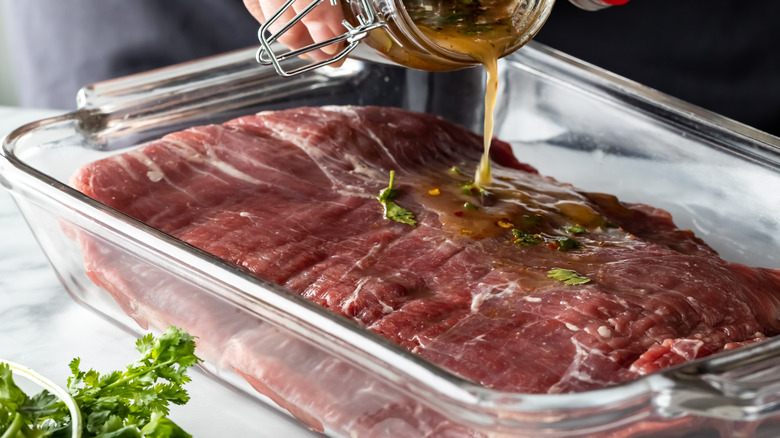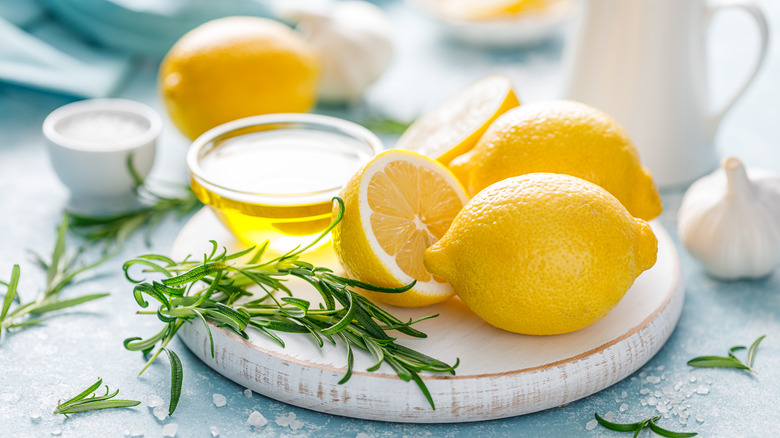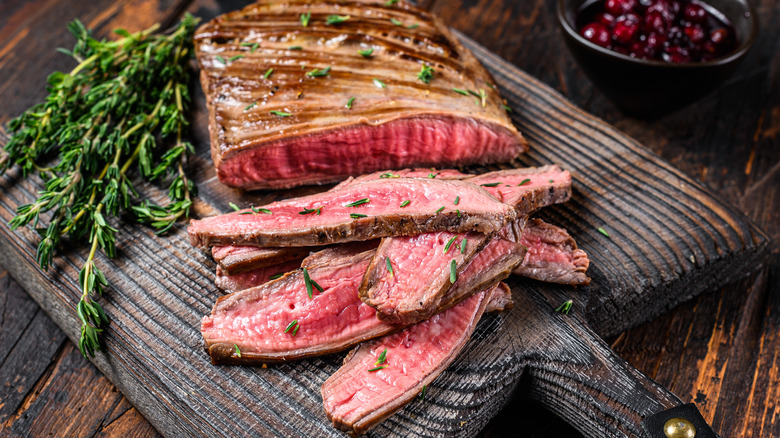The Common Marinade Mistake That's Ruining Your Flank Steak
There's nothing that hits quite like a grilled, marinated flank steak. Though a lot of cuts of steak can take advantage of a marinade, flank steak does particularly well with them. Flank steak has a ton of natural beefy flavor, but as a well-exercised muscle with a relatively thick grain, it has very little fat. This means it can be pretty tough, so the right type of marinade does a great job of helping tenderize the meat in addition to bringing more flavors to the table.
But as with so many things in cooking, timing is everything here. If you don't marinate your flank steak for long enough, you're not going to get the tenderness you want (although short marinades can still contribute flavor). But if you marinate it for too long in an acid (or even in too much acid), you could turn the exterior to mush — which is one of the most common mistakes people make with flank steak. The generally accepted rule is that marinating flank steak in a marinade that has an acidic component for more than just a few hours is a bad idea. And if you're using citrus juice, the time may be even shorter than that — at least, depending on who you ask.
There's disagreement over how long is too long with citrus
People often think the acid in a marinade will fully tenderize a tough steak, but this isn't quite correct. Acids do serve to break down and tenderize meat, but generally only the outermost portion, because marinades don't go much deeper than the surface. But a thinner cut like flank steak is naturally going to have more relative surface area, meaning over-marinating — and thus turning a lot of it into a mushy mess — is even more of an issue than with thicker cuts.
But how long is too long for a marinade when it comes to citrus juice specifically? Of the three types of acid used in cooking applications, citric acid sits in the middle, between the harshest (the acetic acid in vinegar) and the most gentle (the lactic acid in something like buttermilk). You're going to want to marinate for at least one to three hours, and a lot of recipes will say to stop there. But, there are differing opinions on the matter, with other sources saying the ideal timeline for a citrus marinade is overnight, or in some cases as long as a full 24 hours. There's no universally agreed-upon rule, so you'll have to do some experimentation for yourself to see which level of tenderness you personally prefer.
Be mindful of all sorts of marinating mistakes
There are actually a number of other mistakes everyone makes with their marinades. While salt is a great component in marinades, you don't want to add too much because it can sometimes dry the meat out. Consider using soy sauce instead, which also possesses glutamic acid that enhances meaty flavors. And while bold flavors are good thing, be thoughtful with your ingredients, sticking to a theme rather than just throwing a bunch of differing things in there that will clash with each other, or just overwhelm the flavor of your steak. You also shouldn't marinate in metal containers, because the metal can react to the marinade's ingredients and change the flavor profile in unpredictable ways (use glass or plastic instead).
You can also circumvent the issue of over-marinating by marinating your meat after grilling, a technique known as the "reverse-marinade." If you slice your flank steak thinly before the reverse-marinade (and always cut your meat against the grain!), the extra surface area on the thin slices means it will soak up a ton of flavor (although it won't affect the tenderness).
If you want, you could even use this technique to marinate both before and after you cook a flank steak. Just don't soak your cooked beef in the same marinade liquid it sat in before you cooked it, because that's a recipe for introducing contamination from raw meat. (Unless you boil it first, as the USDA recommends.)


